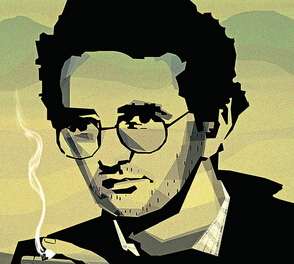(单词翻译:单击)

Among the many acid pleasures of the work of Roberto Bolaño, who died at 50 in 2003, is his idea that culture, in particular literary culture, is a whore. In the face of political repression, upheaval and danger, writers continue to swoon over the written word, and this, for Bolaño, is the source both of nobility and of pitch-black humor. In his novel “The Savage Detectives,” two avid young Latino poets never lose faith in their rarefied art no matter the vicissitudes of life, age and politics. If they are sometimes ridiculous, they are always heroic. But what can it mean, he asks us and himself, in his dark, extraordinary, stinging novella “By Night in Chile,” that the intellectual elite can write poetry, paint and discuss the finer points of avant-garde theater as the junta tortures people in basements? The word has no national loyalty, no fundamental political bent; it’s a genie that can be summoned by any would-be master. Part of Bolaño’s genius is to ask, via ironies so sharp you can cut your hands on his pages, if we perhaps find a too-easy comfort in art, if we use it as anesthetic, excuse and hide-out in a world that is very busy doing very real things to very real human beings. Is it courageous to read Plato during a military coup or is it something else?
罗贝托·波拉尼奥(Roberto Bolaño)于2003年逝世,享年50岁,他的作品中有很多尖刻的欢乐,比如他认为文化是个婊子,特别是文学文化。面对政治压迫、巨变与危险,作家们依然迷恋文字,对于波拉尼奥来说,这是崇高感与黑色幽默的源泉。在他的小说《荒野侦探》(The Savage Detectives)中,两个热心的拉丁美洲年轻诗人一直都未失去对纯净艺术的信念,不管年龄增长,生活与政治发生变迁。他们有时很可笑,但他们一直都有英雄气概。但在他那非凡的、令人不安的中篇小说《智利之夜》(By Night in Chile)中,他问我们,也扪心自问:当军政府在地下室拷问他人的时候,知识分子精英能写诗,能绘画,能讨论先锋戏剧中更精妙的东西,这一切究竟有什么意义?文字没有国界、没有政治倾向;是任何想要成为主人者都能召唤出来的精灵。波拉尼奥的精灵以仿佛能切断读者双手般的犀利反讽发问:我们是不是太容易就在艺术中找到安慰,这个世界忙着对生活中真实的人们做出真实残酷的事情,而我们是不是太容易就把艺术当做麻醉、借口与隐藏之地了?在一场军事政变中阅读柏拉图究竟是一种勇敢,还是别的什么?
“Nazi Literature in the Americas,” a wicked, invented encyclopedia of imaginary fascist writers and literary tastemakers, is Bolaño playing with sharp, twisting knives. As if he were Borges’s wisecracking, sardonic son, Bolaño has meticulously created a tightly woven network of far-right littérateurs and purveyors of belles lettres for whom Hitler was beauty, truth and great lost hope. Cross-referenced, complete with bibliography and a biographical list of secondary figures, “Nazi Literature” is composed of a series of sketches, the compressed life stories of writers in North and South America who never existed, but all too easily could have. Goose-stepping caricatures à la “The Producers” they are not; instead, they are frighteningly subtle, poignant and plausible. Like Leni Riefenstahl, the artistes Bolaño invents share a certain Romantic aesthetic, a taste for the classic and nonvulgar, a dislike of “cacophony” and a lurking sense that something has gone terribly wrong in the modern world — that children, for instance, have been “stolen and raised by inferior races” and that a better world in the form of the Fourth Reich is imminent. There is little to no mention of Jews or other undesirables; there are no death camps; World War II is a passing reference at best. Instead, with a straight face, Bolaño narrates the Nazi writers’ tireless imaginations, their persistence in the face of a world history that goes against them, their contrarian determination as they continue to write books that go unread, unreviewed and largely unnoticed. They’re the losers but, with incredible passion, they remain steadfastly in denial of that fact, churning away at their refutations of Voltaire, Rousseau and Sartre; their verses vindicating Il Duce; their novels decrying the decline of piety; their Aryan literary societies. Like Riefenstahl, they find the highest beauty in a particular sort of symmetry and order that only in retrospect seems indubitably fascist. Horribly, persistently, they have a vision that they are incapable of giving up.
《美洲纳粹文学》(Nazi Literature in the Americas)是一部顽皮的、杜撰出来的百科全书,里面记载了想象出来的纳粹作家和文学风潮领头人,书中波拉尼奥如同在挥舞一把犀利、扭曲的刀子。他仿佛博尔赫斯(Borges)爱冷笑的淘气儿子,小心翼翼地创造出一张严密的,由极右文学家与美文创作者构成的大网,对于他们来说,希特勒意味着美、真理与伟大的失落希望。《美洲纳粹文学》由一系列人物速写组成,是虚构的南北美洲作家们的生平简史,还有参考书目和二流人物的传记书目为它提供相互参照和补充,但生活里很容易找到这样的人。他们并不是《金牌制作人》(The Producers)中踢着正步的漫画式人物,而是极度微妙、深刻、真实可信。波拉尼奥创造出的人物就像雷尼·瑞芬舒丹(Leni Riefenstahl)一样,信奉浪漫主义美学,有古典和新平民审美,讨厌“不和谐”,潜意识里认为现代世界是大错特错的——比如说,他们觉得孩子们“被低等种族偷窃和养育”,觉得在第四帝国统治之下,更好的世界近在眼前。书中没有提到犹太人和其他不受欢迎的人;也没有集中营;“二战”顶多只是已经过去的东西。相反,波拉尼奥一本正经地叙述纳粹作家们无穷尽的想象,他们一直顽强对抗着不利于自己的世界史,他们特立独行地写着无人阅读、无人评论、基本无人关注的书籍。他们是失败者,但又以惊人的热情,坚定不移地对抗他们是失败者这个事实,同时还不断驳斥伏尔泰(Voltaire)、卢梭(Rousseau)和萨特(Sartre);他们用诗歌为墨索里尼辩护、他们的小说哀悼神性的衰亡;他们结成雅利安文学社团。和瑞芬舒丹一样,他们在特定形式的对称与秩序中发现至上之美,这种对称与秩序人们只有在事后才觉得是法西斯主义无疑。他们有一种既可怕又顽固的幻觉,认为自己不能放弃。
They are, in other words, writers. Substitute, say, “language poetry” for “fascism” and the trajectory of these invented lives would be much the same as they are for the busy networks of real writers Bolaño knew from the inside out. Whereas in “By Night in Chile” Bolaño’s dissection of hypocrisy and bad faith (the main character is a morally bankrupt priest allied with the junta) is swift and merciless, here it is not only as if the writer in him couldn’t keep himself from filigreeing in endless perfect and revealing details about his lost souls and their laughable oeuvres, but also as if he couldn’t entirely resist them. As a fellow traveler, he probably knew only too well what it is to pit the invented world on your ratty pages against the firmly stated values of the real world. The imaginary Ernesto Pérez Masón, who pounds away at his novella that is “an erotic and fiercely anti-U.S.A. fantasy, whose protagonists were General Eisenhower and General Patton”; the mysterious beauty Daniela de Montecristo, who loved Italian and German generals during World War II and wrote an epic novel called “The Amazons”; Max Mirebalais, the ceaseless plagiarist who sought to combine Nazism and negritude: the heinousness of their political philosophy is the only thing that distinguishes them from any writer, anywhere, at any time. Moreover, literature, Bolaño writes, “is a surreptitious form of violence, a passport to respectability, and can, in certain young and sensitive nations, disguise the social climber’s origins.”
换言之,他们是作家。如果用“文体诗”取代“法西斯”,这些虚构人物的生命轨迹就和波拉尼奥熟悉的那些真实生活中忙碌的作家们没什么两样。然而在《智利之夜》中,波拉尼奥剖析出虚伪和坏的信仰是易变而残忍的(主角是一个道德败坏、与军政府合作的神父),而在这里,他心中作家的一面让他情不自禁地去浓墨重彩、栩栩如生地详尽描写这些失落的灵魂与他们的可笑行为;而且他似乎无法彻底否定他们。作为一个旅伴,他或许太了解如何在破损的书页上营造幻想的世界,以此抵御真实世界坚固不移的价值观。想象中的人物埃内斯托·佩雷斯·马松(Ernesto Pérez Masón)努力创作他的中篇小说,称之为“一出性幻想,也是激烈的反美狂想,主角是艾森豪威尔将军与巴顿将军”;神秘的美女达妮埃拉·德·蒙特克里斯托(Daniela de Montecristo)热爱“二战”期间的意大利和德国将军们,写了一部名叫《亚马孙人》的史诗小说;不知疲倦的剽窃者马克斯·米雷巴莱斯(Max Mirebalais)想把纳粹和黑人传统文化自豪感结合起来。这些人信奉凶残的政治哲学,这是他们与其他任何时代、任何地点的作家们之间的唯一区别。波拉尼奥写道,文学“是暴力的一种隐秘形式,是通往名望的通行证,在某些年轻而敏感的国度,可以掩盖不择手段挤进上流社会者的出身”。
Who said literature has no real power to affect history? Not Bolaño — for him, literature is an unnervingly protean, amoral force with uncanny powers of self-invention, self-justification and self-mythification. The mythmakers, he suggests, certainly do matter. If Hitler had won, for instance, the not entirely absurd stories in this encyclopedia would be the prevailing stories of the culture. Is Nazi poetry an oxymoron? Not a bit of it, posits Bolaño. On the contrary, it’s all too possible.
谁说文学对历史没有影响力?波拉尼奥肯定不这么认为——对于他来说,文学令人不安地变化多端,是一种无关道德的力量,有着自我创造、自我辩解和自我神化的神秘能力。他认为,编纂神话的人确实非常重要。比如说,如果希特勒胜利了,这本百科全书中并非完全荒诞的故事会成为文学史上盛行的故事。“纳粹诗歌”是一种矛盾修辞吗?波拉尼奥认为,绝对不是。相反,它是非常有可能的。


